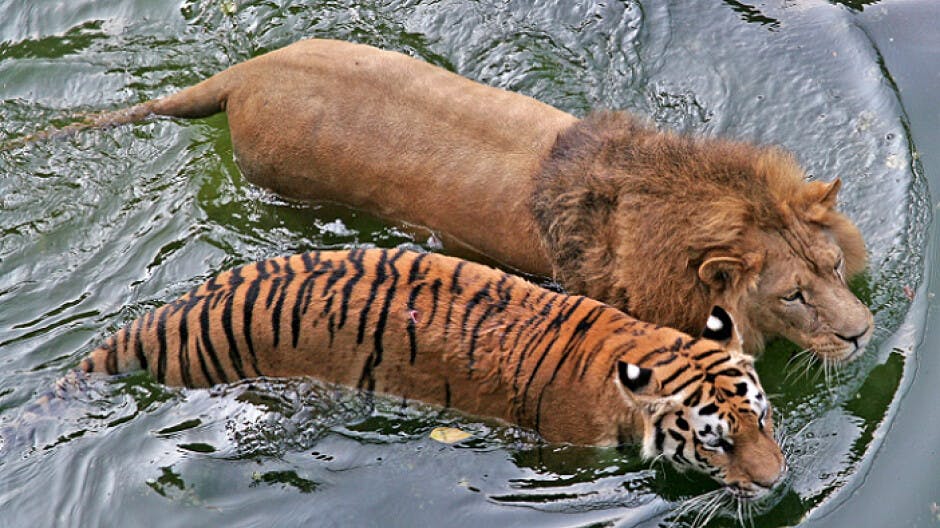習近平訪問歐洲,在柏林發表講話,重申中國的崛起,不會對世界構成任何威脅,中國承諾會與鄰國建立友好夥伴關係。訪問法國時的講話中,習近平把中國比作一頭「睡醒的獅子」,但他稱這是一隻「和平的、可親的、文明的」獅子。
獅子,獸中之王
Lion 獅子,是獸中之王 king of beasts。The lion is a large powerful animal of the cat family, that hunts in groups and lives in parts of Africa and southern Asia. 人中獅子,比喻才能出眾的人。西方人的比喻:as brave as a lion 等同非常勇敢 very brave;fight like a lion 表示勇敢戰鬥,他們也常說:as strong as a lion = very strong。
Lion 在西方國家,有皇帝和英雄的形象:the lion has been the national emblem of Britain since the Middle ages and British is personified as a lion。成語 to twist the lion’s tail means to provoke or insult the British government and defy its policies 以言論觸犯英國、反對或抵制其政策。
中國人愛說:寧為雞口,不為牛後,比喻寧願在一個小團體中當一個領導人物,或被人尊重,也不願在一個大團體中當個下屬,或被人輕視。西方人卻喜歡說:Better be the head of a dog than the tail of a lion: It is better to be the leader of a less prestigious group than to be a subordinate in a more prestigious one.
進獅穴,採獅鬚
漢人用老虎形容勇猛或凶惡的情境,洋人往往卻用上獅子。我們習慣說:明知山有虎,偏向虎山行。西洋成語有 beard the lion in his den,等於 face up to somebody in authority in his environment,面對上司、權勢而不畏懼,味道有點似漢語捋虎鬚、拔老虎鬍子的說法,比喻做冒險的事:進獅穴,採獅鬚,敢於觸犯有權勢者,風險很大。另一個相似的成語 to put one’s head in the lion’s mouth,形容處於危險的境地:to put oneself unnecessarily in great danger and to adopt a position that is risky or foolhardy。
Lioness is a female lion. Tigress is a female tiger.
虎媽的戰歌
Tiger Mom 虎媽 is a stern mother who treats her children very severely. 很多華裔家長,望子成龍、望女成鳳,管教特別嚴格。美國華裔學者 Amy Chua 蔡美兒的著作 Battle Hymn of the Tiger Mother《虎媽的戰歌》,倡導虎媽教育,與西方國家通行的「寬鬆育兒」模式截然對立。虎媽教育方式 tiger mom parenting 一度成為國際話題。
老虎的象徵意義,中西稍有不同。
根據中國古老傳說,老虎象徵長壽、威嚴、武力:the tiger was a symbol of longevity, dignity, and military prowess。虎頭常見於長袍、盾牌以至農曆新年的大門,以示可以抵禦邪惡。西方人的老虎,寓意異常勇敢或極之凶猛:a tiger or tigress is synonymous with a person exceptionally fierce and courageous。老虎最正面的代表有 flying tigers:二次大戰時陳納德將軍的飛虎隊 Flying Tigers, a volunteer group of U.S. airmen led by Major General Chennault around 1941 during the World War II, supporting the Chinese against the Japanese before the Japanese attack of the Pearl Harbour。
騎虎難下
習用語 to have a tiger by the tail is to take on something unexpectedly difficult or a person very formidable,意思相近於 riding on the back of a tiger and not being able to get off,源自中國的「騎虎難下」,情況就像人騎在老虎的背上,被情勢所迫,已經不能下去了,即是形勢已經造成,想罷手停止卻不能,和「勢成騎虎」的意義相同。
紙老虎
至於,紙老虎 paper tiger 的來歷有不同說法。一般認為毛澤東主席首先使用 a paper tiger,1946年在延安與史諾夫人 Anna Louise Strong 談話時,他最先使用「紙老虎」這個詞,指貌似強大,實則虛弱的統治者和侵略者:a paper tiger is an enemy who seems powerful but actually is not. This vivid expression refers to any seemingly powerful but actually ineffectual individual, group, organization, or nation。紙老虎比喻貌似強大、實際虛弱的人或集團,外強中乾,色厲內荏,沒有什麼可怕:a paper tiger may pose in a threatening way,but it is actually completely harmless。
本專欄逢周二、五發表













































